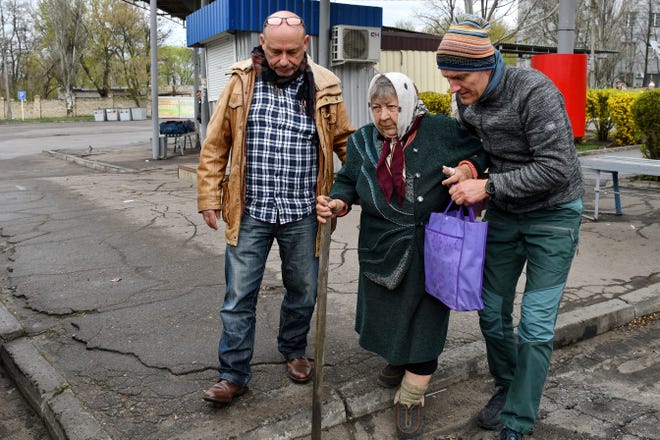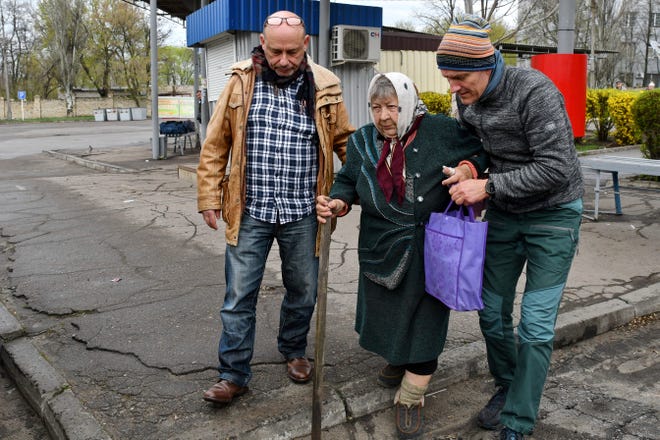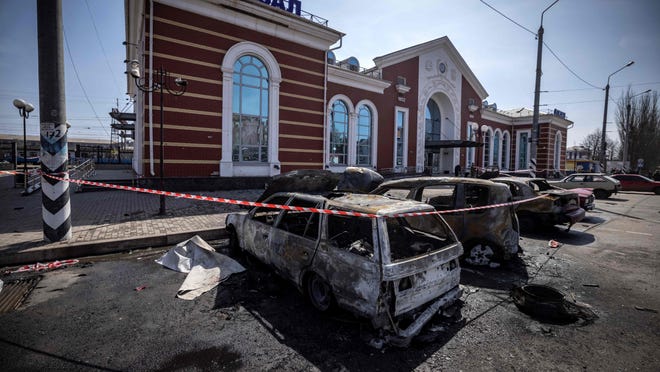Russia’s audacious invasion of Ukraine is proceeding as planned and peace talks have reached a “dead end,” Russian President Vladimir Putin said Tuesday.
Putin, speaking at a joint press conference with ally Belarusian President Alexander Lukashenko, accused Ukraine of violating agreements made during talks in Istanbul. He once again dismissed images of bodies strewn in Bucha and other cities as staged by Ukraine and said Russia’s total focus is on supporting separatists in the eastern Donbas region.
The war will “continue until its full completion and the fulfillment of the tasks that have been set,” Putin said. He said Russian was forced to invade Ukraine to protect ethnic Russians in the separatists state of the Donbas region.
Mykhailo Podolyak, adviser to Ukrainian President Volodymyr Zelenskyy took issue with Putin’s claims on Twitter: “Russia claimed their goal in is to ‘protect people in Donbas.’ Right now mobile crematoria are burning people’s bodies in #Mariupol, the second largest city of the region. Those who survived are dying from starvation. What are you ‘protecting’ them from? From life?”
USA TODAY ON TELEGRAM:Join our new Russia-Ukraine war channel
VISUAL EXPLAINER:Mapping and tracking Russia’s invasion of Ukraine
Latest developments
► Germany’s president says he wanted to visit Ukraine but “apparently wasn’t wanted in Kyiv.” The German newspaper Bild quoted an unidentified Ukrainian diplomat as saying President Frank-Walter Steinmeier is not welcome because of his close relations with Russia in the past.
► A planned cyberattack by Russian military hackers on the besieged nation’s power grid has been foiled, Ukrainian authorities said.
► The World Trade Organization revised its 2022 trade forecast downward to 3% growth from 4.7%, saying the war and continued COVID-19 lockdowns are weighing on world trade.
►Ukrainian police say they have launched a war crimes investigation after a 64-year-old man was killed by a mine in the northern village of Krasne, in an area from which Russian forces recently retreated.
►The United Nations’ children’s agency says nearly two-thirds of all Ukrainian children have fled their homes in the six weeks since Russia’s invasion, and the organization has verified that 142 children have been killed and 229 injured, though the numbers are likely much higher.

US ‘deeply concerned’ over chemical weapons threat
Global concerns that Russia will resort to chemical weapons in Ukraine were rising Tuesday after a separatist spokesman suggested to a Russian TV audience that separatists may use chemicals against Ukrainian soldiers holed up at a giant steel factory in Mariupol “to smoke them out of there.”
Eduard Basurin, who said 80% of the Mariupol port had been “liberated” by Russian-backed separatists, was later quoted by the Interfax news agency as saying separatist forces “haven’t used any chemical weapons in Mariupol.” The comment came after a Ukrainian unit defending Mariupol claimed without providing evidence that a drone had dropped a poisonous substance on its positions.
U.K. Foreign Secretary Liz Truss said officials were working to “urgently” investigate what she called “a callous escalation” of the war. Pentagon press secretary John Kirby called the reports of chemical weapons use “deeply concerning.” Chemical weapons or not, the world should be prepared for a barbaric assault by Russian troops in eastern Ukraine, Kirby said.
“I think sadly we can all expect that those same brutal tactics, that same disregard for civilian life and civilian infrastructure will probably continue as they now focus in a more geographically-confined area in the Donbas,” Kirby said.
Russian convoy rolls toward strategic Ukraine city
A massive Russian resupply convoy in eastern Ukraine that could be crucial to the invasion effort continues to make slow progress toward the strategic town of Izyum, a senior Defense official said Tuesday. The convoy is about 35 miles north of Izyum where Ukrainian forces are engaged in heavy fighting with Russian forces, according to the official who spoke on condition of anonymity to describe intelligence assessments. Russian forces remain about 12 miles south of the town.
The focus of the Russian invasion, which began Feb. 24, has moved into eastern and southern Ukraine, the official said. Airstrikes have been concentrated in those areas. The Russians have lost nearly 20% of the combat force that President Vladimir Putin deployed for the attack, the official said.
Austrian chancellor gets ‘no optimistic impression’ from Putin meeting
Austrian Chancellor Karl Nehammer held “direct, open and tough” talks with Russian President Vladimir Putin in Moscow and said the outlook for ending the war remained bleak. The Austrian chancellor emphasized that the trip had not been a “friendly visit,” adding that he had brought up the issue of war crimes and stressed that “all those who are responsible will be held to account,” according to Austrian media.
Nehammer said he had “no optimistic impression” and urged civilians to flee the offensive Russia is expected to launch in eastern Ukraine. “This battle will be fought with vehemence,” he said.
Mariupol mayor: Death toll could reach 20,000; Russia conceals carnage
More than 10,000 civilians have been killed in the besieged city of Mariupol since the Russian invasion of Ukraine in February, the mayor said, as Western nations warned a convoy was on the move for a suspected Russian assault in Ukraine’s east. The city is crucial to Russia’s effort to link Crimea with the Donbas region, where Moscow-backed separatists have established de facto republics that even Russia only recognized days before the war broke out in February.
Mariupol Mayor Vadym Boychenko said Russian forces have blocked weeks of attempted humanitarian convoys into the city in part to conceal the carnage. Boychenko also said the death toll in Mariupol alone could surpass 20,000.
Boychenko also gave new details of allegations by Ukrainian officials that Russian forces have brought mobile cremation equipment to Mariupol to dispose of the corpses of victims of the siege.
Obama: Putin has ‘always been ruthless,’ but invasion is ‘reckless’
Former President Barack Obama weighed in on the Russian invasion of Ukraine in an interview with NBC News’ TODAY, answering questions about his handling of Russian relations while in office and Russian President Vladimir Putin’s state of mind. Obama also said that the war in Ukraine and the Russian annexation of Crimea in 2014 are a reminder “to not take our own democracy for granted,” adding that the Biden administration is “doing what it needs to be doing.”
“Putin has always been ruthless against his own people, as well as others,” Obama said. “What we have seen with the invasion of Ukraine is him being reckless in a way that you might not have anticipated eight, 10 years ago, but you know, the danger was always there.”
Obama’s full interview with TODAY will air Wednesday.
European countries make moves to ease dependence on Russian energy
Italy will begin importing more natural gas across a Mediterranean pipeline from Algeria soon, Europe’s latest attempt to distance itself from Russia as Moscow faces building accusations of war crimes. Italy’s biggest supplier of natural gas is Russia, representing 40% of global imports. Neighboring Germany gets one-third of its oil and gas and more than half its coal from Russia.
Europe’s dependence on Russian oil, natural gas and coal had left energy sanctions off the table amid fears the entire continent could plunge into recession, although reports of Russian war crimes against Ukrainian civilians have caused some countries to reconsider. Lithuania became the first European country to entirely cut itself off from Russian gas imports in early April.
Italian Premier Mario Draghi told reporters that the agreements to intensify bilateral energy cooperation and export more gas to Italy “are a significant response to the strategic goal” of quickly replacing Russian energy.
Last week, both the U.S. and European Union escalated punishments on Russia: The U.S. Senate voted unanimously in favor of banning the importation of oil from Russia and ending normal trade relations with the country, while European Union nations agreed to new sanctions on Russia that include a ban on importing its coal.
Contributing: The Associated Press





